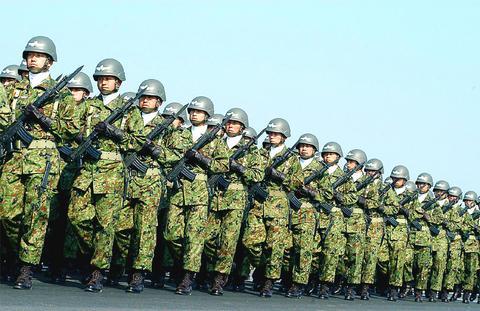Japan's ruling party yesterday endorsed a defense outline that would relax the nation's arms export ban and allow development and production of a missile defense system with the US, Japanese media reported.
The reported approval by the ruling Liberal Democratic Party's (LDP) defense panel paves the way for today's Cabinet approval and official announcement of the new outline of Japan's defense plan for next fiscal year.

PHOTO: EPA
The LDP panel also approved a 3.7 percent cut in defense spending to a total of ?24.24 trillion (US$233 billion) for the next five years, following an agreement reached between the defense and finance ministries, Japanese newspapers reported.
A plan to trim the Ground Self Defense Force to 155,000 by slashing 5,000 from the current level was also approved.
The new guidelines call for an easing of Japan's arms exports ban so that the nation can jointly develop and produce a missile defense system with the US, Kyodo News reported.
Japan in 1967 banned weapons shipments to communist bloc nations, countries under UN arms embargoes or those engaged in conflicts. The ban was extended in 1976 to exports to all foreign countries.
Chief Cabinet Secretary Hiroyuki Hosoda will make an official announcement Friday, Kyodo said. Both the LDP and the Defense Agency refused to comment on yesterday's reports.
The new defense outline, which covers a period from April 1 next year through March 31, 2009, wears away at Japan's postwar policy to maintain a self-defense-only military.
The outline singles out China and North Korea as regional security concerns, and calls for a more assertive role by the military with "prompt, mobile, multifunctional and effective defense capabilities," Kyodo said.
Japan has been reviewing its defense policy amid threats from possible terrorist attacks and North Korea. The North has become one of Tokyo's biggest security worries; it test-fired a long-range ballistic missile over Japan in 1998 and has an active nuclear weapons program.
Japan's postwar pacifist constitution renounces use of force in settling international disputes.
Japanese forces possess short-range missiles under a defensive policy that falls within government interpretations of the constitution.
In a nod to preserving that policy, Japanese leaders set aside a plan to develop long-range missiles capable of making a pre-emptive strike in foreign territory, news reports said.
The LDP's coalition partner, the Komeito party, reportedly opposed the plan.
Also see story:

AIR SUPPORT: The Ministry of National Defense thanked the US for the delivery, adding that it was an indicator of the White House’s commitment to the Taiwan Relations Act Deputy Minister of National Defense Po Horng-huei (柏鴻輝) and Representative to the US Alexander Yui on Friday attended a delivery ceremony for the first of Taiwan’s long-awaited 66 F-16C/D Block 70 jets at a Lockheed Martin Corp factory in Greenville, South Carolina. “We are so proud to be the global home of the F-16 and to support Taiwan’s air defense capabilities,” US Representative William Timmons wrote on X, alongside a photograph of Taiwanese and US officials at the event. The F-16C/D Block 70 jets Taiwan ordered have the same capabilities as aircraft that had been upgraded to F-16Vs. The batch of Lockheed Martin

GRIDLOCK: The National Fire Agency’s Special Search and Rescue team is on standby to travel to the countries to help out with the rescue effort A powerful earthquake rocked Myanmar and neighboring Thailand yesterday, killing at least three people in Bangkok and burying dozens when a high-rise building under construction collapsed. Footage shared on social media from Myanmar’s second-largest city showed widespread destruction, raising fears that many were trapped under the rubble or killed. The magnitude 7.7 earthquake, with an epicenter near Mandalay in Myanmar, struck at midday and was followed by a strong magnitude 6.4 aftershock. The extent of death, injury and destruction — especially in Myanmar, which is embroiled in a civil war and where information is tightly controlled at the best of times —

China's military today said it began joint army, navy and rocket force exercises around Taiwan to "serve as a stern warning and powerful deterrent against Taiwanese independence," calling President William Lai (賴清德) a "parasite." The exercises come after Lai called Beijing a "foreign hostile force" last month. More than 10 Chinese military ships approached close to Taiwan's 24 nautical mile (44.4km) contiguous zone this morning and Taiwan sent its own warships to respond, two senior Taiwanese officials said. Taiwan has not yet detected any live fire by the Chinese military so far, one of the officials said. The drills took place after US Secretary

THUGGISH BEHAVIOR: Encouraging people to report independence supporters is another intimidation tactic that threatens cross-strait peace, the state department said China setting up an online system for reporting “Taiwanese independence” advocates is an “irresponsible and reprehensible” act, a US government spokesperson said on Friday. “China’s call for private individuals to report on alleged ‘persecution or suppression’ by supposed ‘Taiwan independence henchmen and accomplices’ is irresponsible and reprehensible,” an unnamed US Department of State spokesperson told the Central News Agency in an e-mail. The move is part of Beijing’s “intimidation campaign” against Taiwan and its supporters, and is “threatening free speech around the world, destabilizing the Indo-Pacific region, and deliberately eroding the cross-strait status quo,” the spokesperson said. The Chinese Communist Party’s “threats